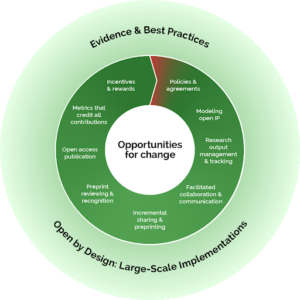The sweeping movement towards open research has set in motion changes across funding bodies, institutions, and scholars. For open research to take off, sharing at all stages of the research cycle needs to be easy and the benefits explicitly recognized.
A new project is cataloguing best practices and promoting real incentives to work in the open, with the aim of improving reproducibility and accelerating outcomes to advance science.
Incentivizing Collaborative Open Research (ICOR) began in 2020 with discussions among a circle of 20 strategists led by Kristen Ratan, founder of Strategies for Open Science (Stratos) and Sarah Greene, founder of Rapid Science. The team set out to identify policies, tools, and practices that can be tested to provide evidence regarding the power of operating in the open. A goal of ICOR is to highlight pockets of innovation and to connect researchers with concrete practices that ease and improve their work in open science.
“There is an increasing recognition that research practices need to be more open to improve the speed, accuracy, and integrity,” Ratan says.“But we have little direct evidence on what works and what doesn’t, how to turn policy into practice, and, importantly, how to measure openness, reproducibility, and policy compliance.”
ICOR is designed to empower community building and highlight specific opportunities for collaboration (see image below). As the initiative gathers a body of evidence, its co-founders hope to demonstrate how open practices can help solve real-world problems and build a library of outcomes, standards, and success stories.
In her work as a scientific publisher and early advocate of open collaborative science, Greene says she talked with researchers who want to share their work but are worried about being scooped and thus losing funding.
“The problem stems from incentives and rewards that are currently based on publication of results in high-impact journals,” Greene says. “New rewards are needed for researchers who collaborate on their early work, and these must be recognized as the path to faster, more reproducible results by funders and academic institutions.”
Opportunities in the research life cycle to move the status quo of closed science (currently mostly red), to collaborative and open (green). For each opportunity, multiple solutions are being implemented that will enable and incentivize generous behaviors. A library of best practices is being compiled based on evidence and case studies and will contribute to large-scale “open by design” initiatives.
Stakeholders are eager for proof that open practices lead to greater innovation, Greene says, and ICOR is actively collecting and presenting evidence to help make the case.
ICOR is tracking projects that run the gamut from establishing baseline measures on open access and open data, tracking outputs of all kinds, studying the value of flipping to open models of research, to building and connecting the infrastructure behind it, says Ratan. ICOR helps funders and other organizations use a policy and tracking framework to change incentives, such as funders counting preprint reviewing in their applications.
To help kick ICOR into high gear, Ratan brought a useful blueprint of open collaborative science policies and procedures she and Greene helped develop with Aligning Science Across Parkinson’s (ASAP).
“We’re building a library for the public of emerging best practices, policy language, and experiments in open research that are happening in the real world, ” Ratan says. “We are helping to design experiments in open research so that we can accurately collect data and derive an evidence base.”
The co-founders say the timing is right for ICOR to gain traction, as researchers globally are increasingly shifting towards open science. During the COVID-19 pandemic, incremental advances, datasets, case studies, and clinical outcomes were being shared openly and much earlier in the process, Ratan says. “Nobody was waiting for a paper to come out. They were sharing preprints. Datasets were live,” she says. “People were talking and collaborating in real-time. It can happen.”
Greene and Ratan have been tracking the progress being made by the Roundtable for Aligning Incentives for Open Science, sponsored by the National Academies of Science, Engineering and Math. Greene says ICOR’s work is complementary and supportive as U.S. agencies, institutions, and philanthropic funders build their strategies.
With a system to track and score open science practices, Greene says the potential impact on the pace of discovery is tremendous: “It will change science, unimaginably.”
ICOR has received an initial grant from the Templeton World Charity Foundation and hopes to expand with additional funding.
